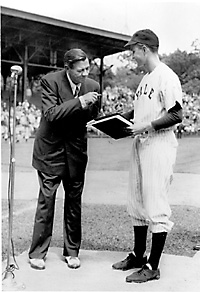The first 20 individuals inducted into the first-ever International Scholar-Athlete Hall of Fame include three Yale alumni -- former U.S. Presidents George Bush and Gerald Ford and former Yale soccer and track standout Dr. Kwaku Ohene-Frempong of Ghana.
Located on the campus of the University of Rhode Island, the International Scholar-Athlete Hall of Fame is associated with the Institute for International Sport (IIS), a nonprofit organization that seeks to foster global friendships through sports culture and education. It was conceived by IIS executive director Daniel E. Doyle, who will direct its progress into the 21st century
"In the United States and around the world we tend to honor the great athlete," says Doyle, a former college basketball player and coach. "Meanwhile, we praise the scholar-athlete but never really honor him or her. The Scholar-Athlete Hall of Fame will now honor the world's greatest scholar athletes."
The individuals inducted into the Hall of Fame hailed from eight countries. The other honorees include tennis star Arthur Ashe, legendary miler Sir Roger Bannister, former U.S. Senator Bill Bradley, ancient philosopher Plato, singer and actor Paul Robeson, former Supreme Court justice Byron White and Pierre de Coubertin, father of the modern Olymic Games.
The inductees were chosen for their distinguished achievements in sports and academics, as well as their contributions to society, by a panel of more than 2,000 academicians, journalists, representatives of national Olympics organizations and former athletes.
Before coming to the University as a member of the Yale College Class of 1948, Bush served for three years as a bomber pilot in the U.S. Navy during World War II and earned the Distinguished Flying Cross and three Air Medals. At Yale, he played for three years with the varsity baseball team, serving as captain during his senior year. He also played for a year on the Bulldogs soccer team. Bush majored in economics, winning the University's Francis Gordon Brown Prize in that subject in 1947.
A football player during his undergraduate years at the University of Michigan, Ford declined several offers to turn pro, instead choosing to come to Yale as assistant coach of its football team and coach of its boxing and junior varsity football teams. For four seasons, Ford worked to gain entry to the Yale Law School, despite the faculty's concerns that he could not handle law school and a full-time job. He finally gained that approval in 1939. Ford continued to coach while attending Law School, graduating two years later in the top third of his class.
An alumnus of both Yale College (1970) and the School of Medicine (1975), Ohene-Frempong was a champion hurdler and soccer player during his undergraduate years. He also set a Heptagonal record in the 60-yard high hurdles (7.1 secs) in 1971 which remains unbroken today. Ohene-Frempong, who is now chief medical officer of the Sickle Cell Disease Association of America, received the NCAA's Silver Anniversary Award in 1995.
The International Scholar-Athlete Hall of Fame is a $3.1 million, two-story facility that will include an exhibition space and museum featuring memorabilia of the inductees, a library of books and periodicals on the history of sport and contemporary issues, a sports photography gallery, lecture halls and administrative offices for the IIS. It was built with funds from IIS and Rhode Island philanthropist Alan Shawn Feinstein.
T H I S
Bulletin Home
 W E E K ' S
W E E K ' S S T O R I E S
S T O R I E S![]()
 Yale students working with city residents to revitalize New Haven . . .
Yale students working with city residents to revitalize New Haven . . .
![]()
 Top women in tennis to vie for Pilot Pen trophy
Top women in tennis to vie for Pilot Pen trophy
![]()
 Enterprise Center helping to transform ideas for new businesses into realities
Enterprise Center helping to transform ideas for new businesses into realities
![]()
 With NIH support, researchers seek ways to heal spinal cord
With NIH support, researchers seek ways to heal spinal cord
![]()
 Exhibit pays tribute to Fossey's work with mountain gorillas
Exhibit pays tribute to Fossey's work with mountain gorillas
![]()
 Entomologist verifies immigrant mosquito's arrival in state
Entomologist verifies immigrant mosquito's arrival in state
![]()
 Artistic transgressions applauded in Yale Art Gallery show
Artistic transgressions applauded in Yale Art Gallery show
![]()
 Fellowship winners devote summer to work in Elm City
Fellowship winners devote summer to work in Elm City
![]()
 Dwight Hall internships provide opportunity for public service
Dwight Hall internships provide opportunity for public service
![]()
 Accomplished high school students will attend Yale as Sterling Scholars
Accomplished high school students will attend Yale as Sterling Scholars
![]()
 Alumni honored for their success as scholar-athletes
Alumni honored for their success as scholar-athletes
![]()
 Support renewed for Yale-China's summer institutes
Support renewed for Yale-China's summer institutes
![]()
 Links between environment, economy explored in new books
Links between environment, economy explored in new books
![]()
 Yale affiliates featured in exhibit focusing on East and West Rocks
Yale affiliates featured in exhibit focusing on East and West Rocks
![]()
 Noted pediatrician T. Berry Brazelton to speak at annual conference
Noted pediatrician T. Berry Brazelton to speak at annual conference
![]()
 Campus Notes
Campus Notes
![]()
 Tentacled trek
Tentacled trek
 |
| Visiting on Campus
Visiting on Campus |
| Calendar of Events
Calendar of Events |
| Bulletin Board
Bulletin Board
Classified Ads |
| Search Archives
Search Archives |
| Production Schedule
Production Schedule |
| Bulletin Staff
Bulletin Staff
Public Affairs Home |
| News Releases
News Releases |
| E-Mail Us
E-Mail Us |
| Yale Home Page
Yale Home Page

| George Bush, as captain of the Yale varsity baseball team, greets Babe Ruth during the Bambino's 1948 visit to Yale Field.
| |